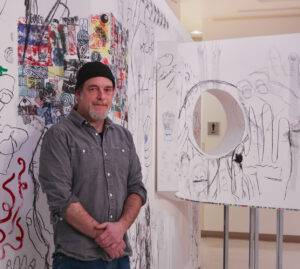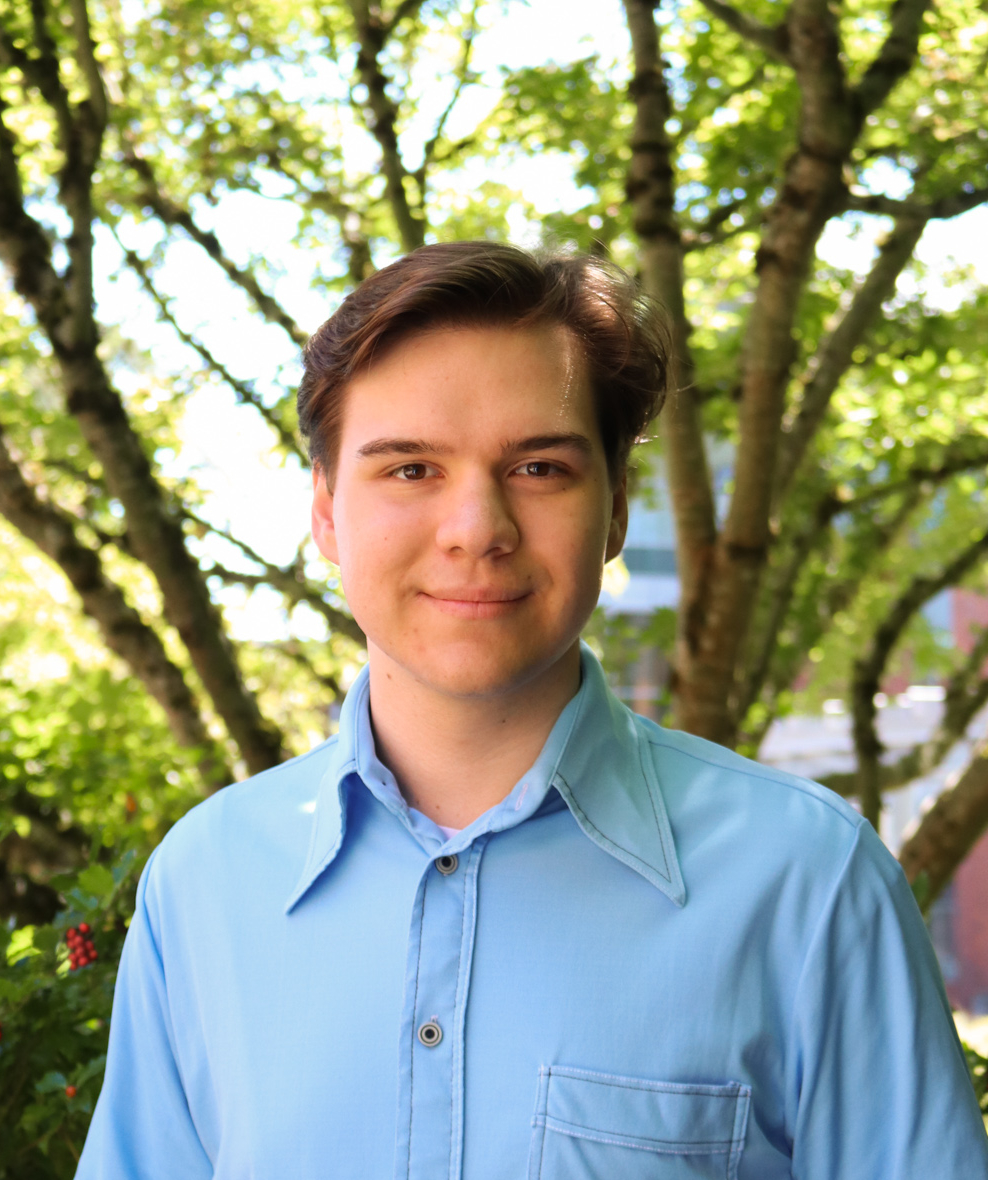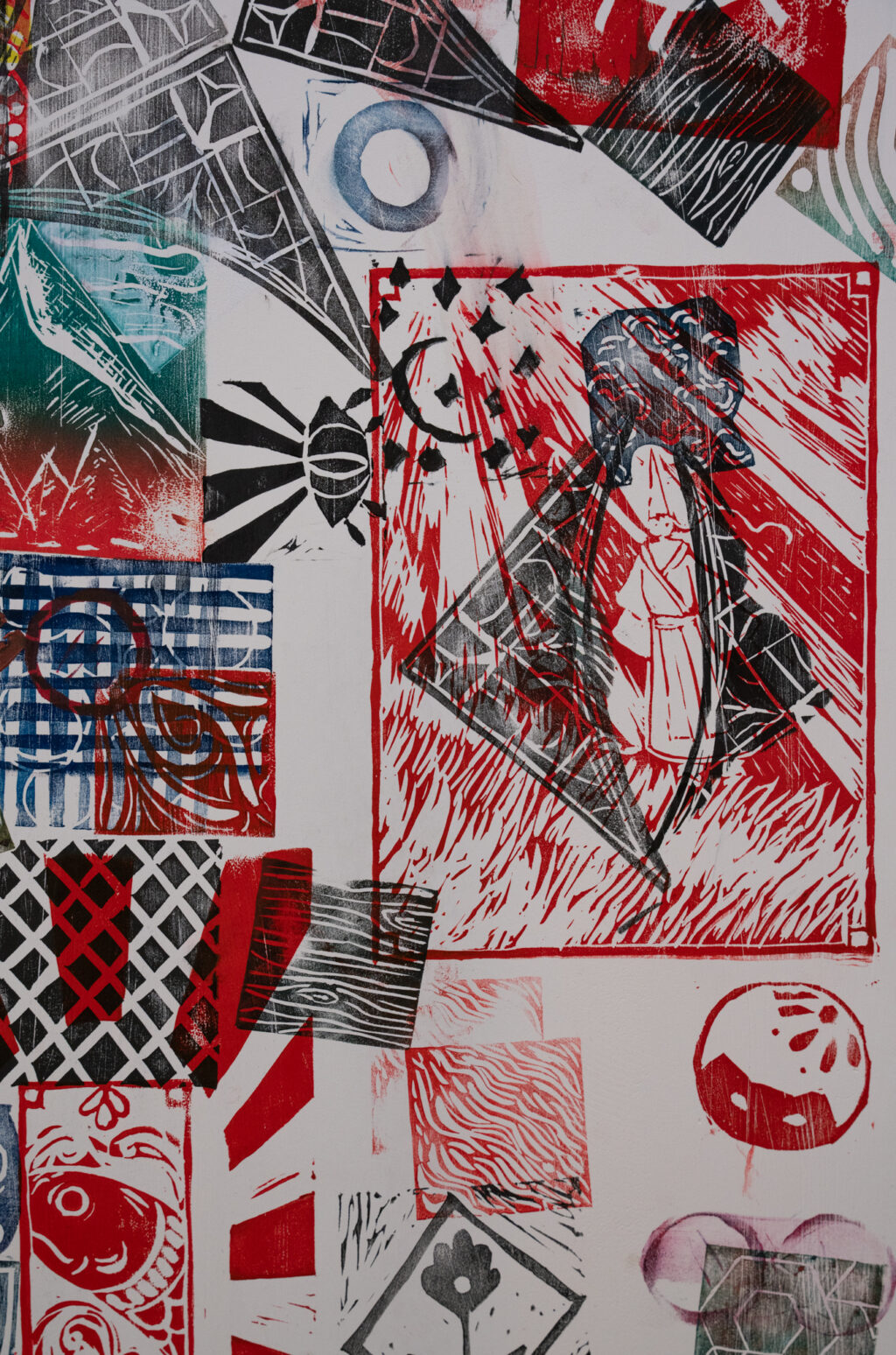This story was originally published in Vol. 33, Issue 7 (March 2023)
Artist and craftsman carpenter Karl Burkheimer’s installation “(re)site,” on display in the Dengerink Administration Building Gallery, is an interactive environment exhibition, encouraging fine art students to modify the piece however and whenever they wish. Instead of maintaining its original form as a monolith, “(re)site” is actively transforming through the engagement of the WSU Vancouver fine art community.
Burkheimer has lived in the Pacific Northwest since 2001, working as a full-time art instructor at the Oregon College of Art and Craft for 19 years until the school closed in 2020. Throughout his career, Burkheimer has used elements of structure and alteration to build environments that explore modification, change and the contemporary human condition.
According to Burkheimer, the changes “(re)site” undergoes represent not only the inevitability of transformation but also the way our perspective of art changes. Burkheimer attests that just as the most concrete of buildings erode and change over time, our view of art will always transform as well.
“The moment is all mine until the day it’s published. It’s installed in a public space and from that moment on it becomes less and less mine and that’s even if the piece was never touched by anybody else. Because people look at it, they make decisions about it and the piece changes. It’s out of my hands, and so [(re)site] is just practicing that [concept] in a more extreme way,” said Burkheimer.
Burkheimer built “(re)site” in his Portland studio over the course of a few days by using metal frames, wood and drywall. Once completed, Burkheimer tore the installment apart and pieced it back together on campus. To Burkheimer, that repetition is part of being an artist, which inspired the name “(re)site,” a play on the word “recite.”
“I’m quite interested in the ‘re’ prefix … To be an artist, it’s a practice. It’s a commitment to practice, which means it’s a return and iteration.” Burkheimer said. “‘Site’ I think is a very wonderful word. It’s a [word meaning] a place where one builds, or [the name] of a specific place. And while it’s spelled differently, what we base all of our visual arts on is having sight.”
Burkheimer said he plans to visit the site periodically, making slight changes to contribute to the installation’s alteration. WSU Vancouver fine arts technician Noah Matteucci helped Burkheimer install “(re)site,” and occasionally adds to the installation as well. According to Matteucci, the top portion of the installation had to be cut due to safety concerns within the first week.
“[The installation] came in four pieces. Three wall panels, that curved piece, [and] its metal frame … It was just a little too high for the fire code, so [Burkheimer] just had to lob off and cut off the top in order to make it fit within those guidelines. So his first collaboration wasn’t really with the students, it was with facility operations,” Matteucci said.
Matteucci said that “(re)site” gives students a place on campus where they can create visually. According to Matteucci, the campus needs more activities for students to get involved creatively outside of the classroom.
“Let’s get a student mural that students can apply to paint on campus and then they paint over it, and every year it changes. I think that would be cool,” Matteucci said.
While Burkheimer and Matteucci apply subtle changes to help the piece evolve, its theming and purpose are actively being shaped by the fine arts students contributing to the exhibition. Senior fine arts major Jamie Anoai-Shroyer is one of the students who utilized techniques taught in their art classes.
“We all individually created some stamps out of this rubber line and cut material … we had a [few] spots designated on the wall installation where we picked up and printed and [we] collaborated with each other and with Karl,” Anoai-Shroyer said. “That was really fun and exciting.”

Anoai-Shroyer believes “(re)site” can be used by the WSU Vancouver community to share their voices, claiming that it isn’t often that students get to collaborate artistically in a public space.
“We have voices individually and we have a collective voice as well. I feel like that can really come through in a project like this,” Anoai-Shroyer said. “I feel like there’s a really great opportunity here to implement some political statements … nothing is off limits, and so I took that as an opportunity to spread some messages on there as well.”
Numerous fine art classes have already contributed to “(re)site,” incorporating blind contour, sketches, messages and color into the installation. CILA, ArtX and other art classes are scheduled to add to the installment throughout the month of March. “(re)site” will continue to shift in form, theme and message until its removal on March 31. To Burkheimer, the temporary state of “(re)site” is symbolic of its theming.
“Even the most concrete materials [are] constantly changing. Materials erode, change, patina. Buildings go out of favor and are torn down. It’s a complete situation of flux,” Burkheimer said. “So [the] idea is that space is always changing … our view of art is always changing … the idea [is] engagement, not that I make a monolith, and that it stays rigid until the day that monolith is removed.”

Norman is a senior majoring in Integrated Strategic Communications and Digital Technology & Culture.
